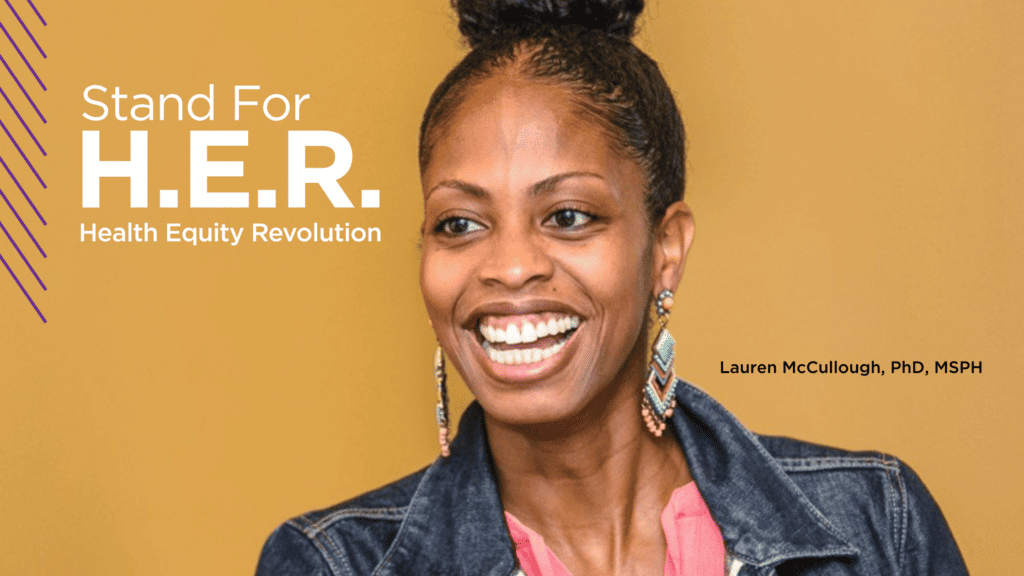
Researcher tackles breast cancer disparities by exploring what’s happening ‘above’ and ‘below the skin’
To better understand breast cancer disparities, Lauren McCullough, who has a doctorate in epidemiology¸ studies factors such as race, ethnicity, socio-economics and geography.
She also focuses on genetics, epigenetics and other biomarkers.
In other words, she tries to understand how experiences “above the skin” influence what’s going on “below the skin” to impact breast cancer outcomes.
The goal of her research is to improve cancer outcomes among marginalized women with low incomes by identifying molecular targets for behavioral and therapeutic intervention.
To do that, the Atlanta-based breast cancer epidemiologist explores how women’s lived experiences play a role.
Breast cancer death rates have declined across-the-board in the U.S., but less so for African American women.
“That is the gap that we are trying to understand and close,” says McCullough, an assistant professor in epidemiology at Rollins School of Public Health at Emory University. “We have targeted therapies and improved screening, but African American women are still diagnosed at later stages with more aggressive tumors and are less likely to survive.”
Black women who are highly educated, with insurance, above-average income and access to health care fare much worse than white women with similar backgrounds living in similar neighborhoods.
Nationally, Black women are 40% more likely than white women to die of breast cancer. In metro Atlanta, Black women are twice as likely to die. African American women have poorer outcomes even when their tumors are considered highly treatable and initial therapy follows recommended treatment guidelines.
A lag between initial screening and diagnosis might help explain the difference. That’s why it’s important for women to be their own advocates, McCullough says.
“You’re not going to survive your cancer without medical intervention, so women must ask questions and identify advocates to accompany them to appointments if they need support,” she says.
“Your doctor knows the science, but only you know you,” she adds. “Cancer is a very individualized, personalized disease, and it’s really difficult to treat a person without that context.”
Cancer first touched McCullough’s life when she was a college sophomore and her father was diagnosed with metastatic lung cancer. A close childhood friend was diagnosed with triple negative breast cancer and died at age 31. Two aunts were diagnosed with vaginal and breast cancer.
Through their experiences, she saw up close how difficult it can be to navigate health care.
“It made me think about individuals with limited resources and limited control of their own time, especially if they are working a nine-to-five job and their family depends on them,” she says.
That’s where Komen can help patients and their families with resources and support, she says.
McCullough is an active member of the Komen family — helping out with MORE THAN PINK Walks and giving talks, among other activities. She became more deeply engaged, participating in educational forums with survivors, sharing her research and serving as an adviser.
“I’m constantly reminded of some of the challenges and barriers that our patients face in the cancer setting and the amount of support that is necessary to deal with the initial diagnosis and treatments,” McCullough says. “Breast cancer is not something that you get cured of and just go on your way. There are some long-term side effects and considerations for your health. All of that plays a role in how I approach my work.”
Greater use of multidisciplinary approaches through closer collaboration between basic scientists, clinical teams and population scientists could help narrow the disparity gap and improve outcomes for all women by investigating breast cancer holistically from different lenses, angles and expertise.
“Integration across research areas is where I hope we are headed,” she says.
McCullough is proud to have built a new research program at Emory that is training master’s degree, doctoral and medical students, who bring incredible passion to their work to eradicate cancer.
She says, “it’s critical to train the next generation of scientists to move the work forward.”
Optimistic about the future of breast cancer treatment, McCullough believes that more advances are likely for some of the more aggressive cancers, such as triple negative breast cancer, which Black women are more likely to get diagnosed with and die from.
“We really have made great strides in improving longevity after a diagnosis of breast cancer,” she says. “I think that’s important for people to know.”



